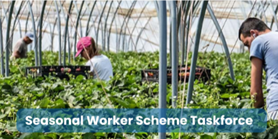
June’s Labour Market Insights
24 Jun, 20244 minutesLabour Market Overview The latest ONS Labour Market Overview show that:UK unemploy...

Labour Market Overview
The latest ONS Labour Market Overview show that:
- UK unemployment rate increased again to 4.4%, with 1.510 million people unemployed
- Unemployment amongst young people remains high, particularly the youngest age group (aged 16-17 = 27.2% / aged 18-24 = 11.8%)
- Employment rate was largely unchanged at 74.3%, with 32.96 million people employed
- UK economic inactivity rate was slightly up on the last quarter at 22.3% and higher than 12 months ago. The quarterly increase was largely due to those aged 50 to 64 and the annual increase was mainly due to 16 to 24 year olds.
- 9.43 million people are economically inactive, an increase of 385,000 on last year and 883,000 higher than pre-pandemic levels.
- Vacancies fell again to 904,000, the 23rd period fall, down 12,000 from previous quarter, but higher than pre-covid levels. This means there were 1.7 unemployed people per vacancy in February 2024 to April 2024, an increase from the previous quarter due to falling vacancy numbers and rising unemployment.
- Payrolled employees for May 2024 were 30.32 million, a rise of 0.6% compared to last year. This is a rise of 167,000 over the last 12 months. 1.29 million higher than pre-pandemic levels.
- Annual growth in regular pay without bonus increased by 6.0%, and with bonus by 5.9%. Adjusted for inflation, annual growth regular pay was 2.3% and total pay was 2.2%.
- Claimant count increased by 35,200 on the month and 100,2000 on the year to 1.629 million. This is the measure of those receiving benefits principally due to being unemployed.
- Redundancies decreased to 3.4 per thousand employees, 0.2 higher than last year.
- 17,000 working days were lost because of labour disputes in April.
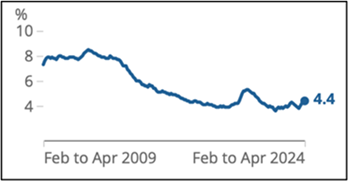
The ALP has published its latest Labour Supply Chain Survey Results. The key findings include:
- The biggest current challenge for labour providers is lack of client/volumes with two thirds supplying fewer workers.
- For employers, the biggest current challenge is the cost of labour with 6 out of 10 choosing to recruit temporary workers directly.
- Both labour providers and employers are calling on the government to incentivise UK workers to take up jobs as well as extend the immigration route visas to lower-skilled workers.
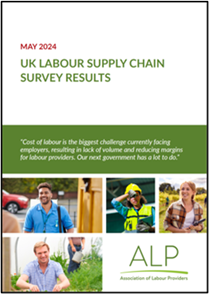
People Management reports that a quarter (27 per cent) of workers in the UK plan to change jobs within the next six months.
The poll of 12,000 people in the UK aged 18 to retirement age found that these figures are rising – just 24 per cent planned to move jobs within the next six months this time last year, dropping as low as 22 per cent in 2022 and 19 per cent in 2021. However, in January 2020, 26 per cent said they were planning to change jobs, exceeding their pre-pandemic levels.

People Management reports that almost one-fifth of workers have fallen out with colleagues because of opposing political beliefs, according to a survey by HR platform HiBob. The survey also found that a third of employees feel uncomfortable expressing their opinions on politics at work. Younger employees (18-24 year olds) thought respectful political discussion should be encouraged.

UK Immigration Policy
The government has published the latest immigration system statistics for the year ending March 2024:
- 125.5 million arrivals, 13% more than the previous year.
- 3.4 million entry clearance visas granted, 7% higher than before the pandemic. 59% were visitor visas.
- 315,018 work visas granted, 130% higher than pre-pandemic levels
- First quarter of 2024 saw 75% fewer Skilled Worker Health and Care visas granted
- Skilled Health and Care visas provided most of the growth, with 118,522 grants
- 139,175 graduate route extensions were granted for the main applicant, 49% higher than the previous year
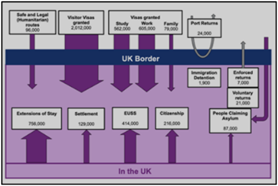
The Resolution Foundation latest briefing Life in the slow lane found that the population grew by 0.7 per cent per year between 2010 and 2023, equivalent to 6 million more people. This was the fastest rate of population growth for a century, and three-quarters of it was driven by migration, with the 0.5 percentage point contribution, the biggest in any 20-year period on record.
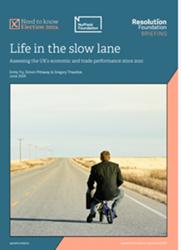
Personnel Management reports on the government decision to reject the proposal by the EU commission to facilitate youth mobility between the UK and EU. The UK government has been extending the Youth Mobility Scheme to other countries, including Andorra and Uruguay, as well as increasing the number of places available for Japan and South Korea and increasing the length of visas in other countries. This expansion of the scheme indicates one of the few areas of UK immigration policy the government is enlarging. This desire to expand the youth mobility scheme seems at odds with the UK government’s decision to reject the EU’s invitation to negotiate as a region. However, the UK did say it would continue to reach out to individual countries across Europe to establish a bilateral relationship, so there is hope that more countries could soon be added to the scheme.

The Migration Observatory has launched its UK election 2024: immigration tracker. It provides a table comparing statements on immigration policy made by the Conservative Party and the Labour Party ahead of the 2024 election. It covers asylum and migration enforcement policies and legal migration policies, and they will be updated as the election progresses. It explains what each policy area is about and summarises the Conservative and Labour approaches.

Seasonal Workers’ Scheme
The government’s confirmation of the extension of the Seasonal Worker visa route to 2029 was very timely, coming just before the Prime Minister called the general election in July. In 2025, there will be a total of 43,000 visas in horticulture (2,000 less than 2024 and the extra 10,000 has been removed) and 2,000 in poultry.

The Business and Human Rights Resource Centre reports that leading supermarkets have been asked to meet costs of implementing the Employer Pays Principle across supply chains. In May 2024, civil society groups, including Landworkers' Alliance, FairSquare, Unseen, Work Rights Centre and migrant worker specialist Andy Hall, published an open letter calling on supermarkets to implement the Employer Pays Principle (EPP) in the UK Seasonal Worker Scheme (SWS), across the tier 2 visa scheme and across global supply chains.

The multistakeholder Seasonal Workers Scheme Taskforce continues its focus on implementing practical actions to improve the responsible recruitment and employment of migrant workers into UK farms, and to work with Government departments on the operation of the Scheme.
